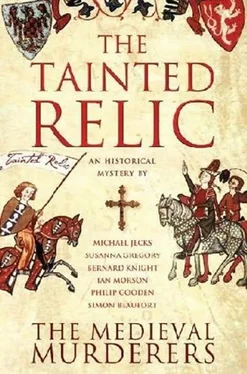To escape this miserable existence, it was essential for him to have money, to tide him over until he could build a new life. Until two years ago, he had been a parish priest in a hamlet near Yeovil, where he was born. He had never been a good priest, having been pushed into becoming a choirboy at Exeter Cathedral, after his shoemaker father died and his mother could no longer support five children. At eighteen, he progressed to becoming a ‘secondary’, an apprentice priest in the household of one of the cathedral canons. In due course, at the requisite age of twenty-four, he was ordained as a priest, and served the canon as one of his vicars, attending most of the endless services each day while his master stayed at home taking his ease. Dissatisfied and disgruntled, he eventually obtained a living at a parish near his home town and, though it was a poor one, at least there he was his own master. A fondness for wine and occasional trips to a brothel in Exeter, however, made him discontented with his miserable stipend, and he was driven by debt to sell a chalice and plate from his own church, claiming that they had been stolen. He was soon exposed and the bishop’s Consistory Court expelled him both from his parish and from the priesthood. It was only by claiming ‘benefit of clergy’ that he avoided the Shire Court, which would surely have hanged him, as all thefts of objects worth more than a shilling were felonies and inevitably carried the death sentence.
Thrown out of his living, Gervase turned to petty crime to survive and, following thefts from various villages, he was soon was on the run from the ‘hue and cry’. The only place left was the forest, and for the past year or so he had been living rough with this handful of crude companions. He was careful not to let them know that he had been a priest; his tonsure had grown over before he became outlaw and he never revealed that he could read and write, a legacy from his days in the cathedral school that he had attended as a choirboy. Gervase was not quite sure why he had hidden his background, except to avoid possible ridicule from their jealous tongues, but now he was glad, as they would not realize that he recognized that at least one of the relics in Blundus’s pack was of some value.
The band of outlaws usually split up each day, going about their own nefarious business, but meeting either that evening or the next at some pre-arranged rendezvous in the woods. This time, the former priest hoped that, with luck, he would never see them again, if the plan that was fermenting in his mind was successful.
Early that afternoon, Gervase was resting up in a thicket just inside the edge of the forest, a few hundred paces from the Exeter road. The next part of his plan required the cover of darkness, so he was dozing under a ragged blanket that he usually wore wrapped around his shoulders, trying not to shiver in the late autumn chill.
He was unaware of someone passing on the muddy track who had much in common with him-another unfrocked priest. Thomas de Peyne was jogging by on his pony, sitting side-saddle like a woman. He was following the rest of the coroner’s team and the reeve from Clyst St Mary as they rode to inspect the body of Gervase’s victim. A mile farther on, they saw a small group of men standing at the edge of the track, under a canopy of red-and brown-leafed trees.
‘They are my men, guarding the corpse,’ announced the reeve, and when they dismounted and approached the sentinels, they saw a still figure sprawled face down in the grass and weeds. Gwyn and the coroner squatted alongside it and de Wolfe tested the stiffness in the arms and legs. ‘Been dead at least a few hours,’ he grunted, then ran his fingers over the back of the cadaver’s head, where he felt dried blood in the hair and a pulpy swelling covering half the top of the head
‘Not much doubt how he died,’ said Gwyn, with grim satisfaction, as he laid his own fingers on the scalp. ‘He’s had a good hammering on his head-come and have a feel, Thomas!’ The big Cornishman could never resist teasing the clerk, as he knew how squeamish Thomas was about such matters.
John de Wolfe looked down at the body, taking in the sober but good-quality serge breeches and leather jerkin, with a stout pair of clogs on the feet.
‘Not a yeoman nor a journeyman,’ he mused. ‘Neither does he look like a pilgrim or well-to-do merchant.’
‘He’d do for a chapman, I reckon,’ said the reeve. ‘Though he’s got no pack.’
Gwyn heaved the body over on to its back. ‘He still has a scrip on his belt,’ he grunted, opening the flap of the purse attached to the dead man’s belt. ‘Empty! Whatever was in it has gone the same way as his pack.’
Though not mistrusting his officer, John felt obliged to look for himself, and he frowned as his finger picked up some glinting specks as he poked into the corners of the pouch.
‘Strange! Looks like shards of gold leaf.’
‘Maybe he was a goldsmith?’ hazarded Gwyn. ‘Though they rarely travel alone, given the value of their wares.’
One of the villagers, who stood forming a silent audience, spoke up.
‘Plenty of bloody outlaws in these woods. Damned menace they are, stealing from us all the time. I lost three chickens last week-and it weren’t no fox, neither.’
‘They don’t usually kill, though,’ admitted the reeve.
‘He was just unlucky, this fellow,’ said the coroner. ‘They must have hit him harder than they intended.’
Even with the body face up, no one recognized the man. His face was discoloured from the death staining that had run downward into his skin, except where the nose and chin remained pale from being pressed into the ground.
‘Stranger, he is!’ remarked another bystander. ‘Not from round here.’
Between them, Gwyn and the reeve pulled off the jerkin, undershirt and breeches and examined the rest of the body.
‘Some nasty scratches on his chest and loins-and big fresh bruises as well,’ observed the coroner’s officer, pointing to some pink-red discolorations on the victim’s trunk. He felt a couple of broken ribs crackling under the pressure of his big fingers.
‘Been kicked, no doubt,’ grunted de Wolfe, an expert on all manner of injuries after two decades of fighting in Ireland, France and the Holy Land. He looked up at the reeve.
‘You said he was still alive when he was found?’
One of the villagers, an older man with grey bristly hair, answered.
‘Only just, Crowner! I found him and he lasted no more than half an hour after that before he passed away, God rest his soul.’
‘He said nothing about who attacked him?’
The man shook his head. ‘Anyway, he wouldn’t recognize some bloody forest thieves, especially as he’s a stranger. All he got out with his last gasps was “Glastonbury”-and then something about some curse.’
De Wolfe glared at the villager. ‘What sort of curse? Was he just cursing those who attacked him?’
‘No, there was some name he called it…what was it, now?’ The elderly villein scratched the grey stubble on his face as an aid to memory. ‘Yes, strange name it was, stuck in my memory…Barzak, that was it!’
It was dusk by the time John de Wolfe got back to his house in Martin’s Lane, a narrow alley that joined Exeter’s High Street to the cathedral Close. It was a tall, narrow building of timber, one of only three in the lane, facing a livery stable where he kept Odin, his old warhorse. He was in good time for the evening meal and so avoided a sour face from his wife Matilda, who was forever complaining about the irregular hours that resulted from him being the county coroner-though it was she who had pushed him into the post several months before, seeing it as a way to claw her way farther up the social ladder of the county hierarchy. Her brother, Sir Richard de Revelle, was the sheriff of Devon, and to have a husband who was the second-most senior law officer was another feather in her snobbish cap.
Читать дальше












